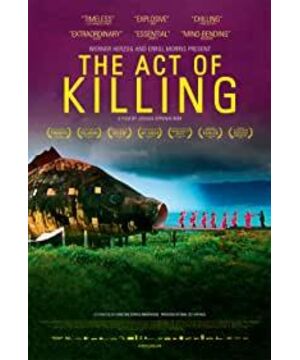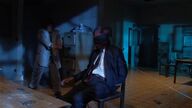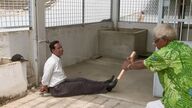In the movie, where does the so-called weirdness come from? The absurdity from the historical background, the results of the analysis of big data, the number of deaths of the Communist Party that was wiped out in Indonesia is countless. It is based on the fact that it is a very special case in the world. The people who have experienced it in the film and slowly tell the story, not only point to the history, but also point to the legend. In the process of filming, it is no longer the same. What they say is to restore history, in fact, it is more like a movement to create gods. In a movie with ideology first, the strange thing, or what makes people feel more complicated, is that it is placed in a false production environment, whether it is the crowd or the leading actor, in this scene that knows the falsehood. Fear, joy, and numbness. In the fake scene, the real emotions of people and the poor quality arrangement form a sharp contrast. Maybe, in front of the camera, we don't take these ridiculous props seriously, but we are in front of the camera. People who live in the real world regard everything as happening in the present. In this contradiction, people's emotions are exaggerated, they are separated from the current scene, and they give up the narration attached to the event, until the purest emotion, like Animal-like performance. However, there is room for this scene to be resolved. When the description of the executioner in the air tells us the history sealed here or there, we subconsciously put a symbol called "real" on the bricks and tiles we see. He also tends to feel the tragedy that happened at that time with the protagonist, and refuses the current interpretation. The so-called strange feeling, roughly speaking, is how it came.
Of course, the author played a structural trick in this film, but he also had a clear point. While filming on film, whether unintentionally or intentionally, CANGO will always review those scenes that have already been shot. If it is placed in the film workflow, it is not surprising, but when the camera of the film is aimed at the CANNGO record When he sees the reaction, we will understand that the author is not only a record, but a critique, a revelation. When CANGO gave some kind of explanation to its own actions, or expressed some kind of opinion on the film, in these segments, CANGO explained each segment in detail from the simple to the deep. Of course, the mouth also It cannot be separated from the political symbolic interpretation of the characters in his films, as well as the meaning displayed by the truth corresponding to the history. After the last interpretation, CANGO and the two grandchildren watched the clip. After a paragraph, CANGO let the two grandchildren leave, and pointed the final question to himself, and carried out a self-analysis-like interpretation. The effect is still "acting", specifically "empathy". The fear that CANNGO faced in the above-mentioned false scene made him understand the trauma he caused to people when he was young. What he interprets is that he regards the people he slaughtered as not human beings, but a symbol, a representative of "a certain doctrine", and as an executioner, the sins he bears should be attributed to the country and to the leaders who gave orders. This is An important factor in his ability to subconsciously kill, of course, is the bloodthirsty nature of the person himself. Therefore, in this history, the evil does not lie in people, but in a certain system. However, such a system is still being implemented in Indonesia. What I have to say is that the system should be removed and the evil should be returned. To man himself, the so-called repentance, will happen and will dissipate quickly. What makes all this change is the filming. There, CANNGO can slightly remove the shackles caused by the system, so that in a small space, it can fill itself with thinking, think about the meaning of history, the meaning of self, When facing the purest self, he will understand that he has been alienated to such a degree, and this process itself is a deduction, a repression and release in the film, caused by every fragment before the end of the film. The accumulation and the accumulation of quantity can lead to qualitative changes, allowing CANGO to break out of all frameworks and examine itself. The return of humanistic care may only be a glimpse of the material, but for this film, it is enough. The impact on people is so clear, and the structure of the first level (documentary) is even more indicative that this is a In line with the Hollywood story, rather than as a deeper interpretation, in a sense, the author who has played so many tricks on the display has done enough. The combination of material makes and destroys the film.
The moral value of the film is also extremely critical. As the author hidden behind the scenes, it is understandable to guide CANNGO in various ways. However, I have to say that after going through all the hardships, the conclusion drawn is so simple and so straightforward. White, simple and surprising, the heavy humanistic care intercepted CANNGO's remorse, and retched at the execution ground, that's all, the whole life of CANGO was destroyed that night, and the first What about him in the next two days? He lives on affirming the actions he has made, and the person who survives, how did he survive after that night? There is no answer in the movie. As far as the authors are concerned, their goal has been achieved, which is to make CANGO feel guilty for their actions. Then, they are eager to prove their orthodoxy, and they also smeared heavily in a very mocking way for their overflowing humanistic care. But the power of sarcasm lies in hurting people. When they stand firm in a position of superiority, bring cameras, and become judges to examine the prisoners in front of them, who can be judges who criticize the author? I don't know, but I understand that our actions may be salvation or destruction, and there is only a fine line between salvation and destruction. The real ending doesn't stop there, and all we can see is this.
View more about The Act of Killing reviews










